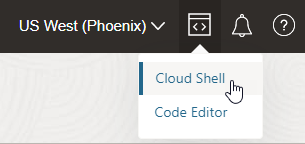Increase the Number of Instance Message Packs from the Command Line
You can increase the number of message packs used by your instance by executing a command from the Oracle Cloud Infrastructure command line (OCI CLI). The OCI CLI enables you to set higher message pack values than permitted by the user interface (Edit Integration Instance dialog).
The OCI CLI is part of the Cloud Shell. The Cloud Shell provides access to a pre-installed Linux shell with a pre-authenticated Oracle Cloud Infrastructure command line. See Cloud Shell.
- After updating the number of message packs from the CLI, it takes up to 24 hours for any additional resources to be added to the instance.
- Changing the number of message packs impacts how you are billed.
The following steps provide an example of how to increase the number of message packs for your instance. The Cloud Shell supports a variety of features, tools, and utilities. You must also grant a specific IAM policy to the user requiring access to the Cloud Shell. See Cloud Shell.
